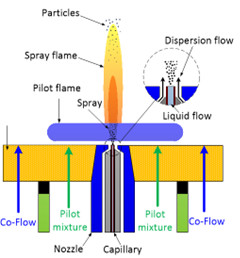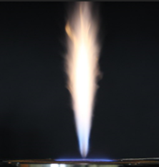DFG Priority Program 1980
„Nanoparticle Synthesis in Spray Flames: Spray Syn: Measurement, Simulation, Processes “, Project „Reactions of the precursors for spray-flame of nanoparticles during partial evaporation of the spray “
Spray flame synthesis is a promising approach for the production of functional nanomaterials. The spray is used to convert precursors that are difficult to vaporize into the vapor phase. In the first step of spray flame synthesis, spray formation and vaporization processes are superimposed with chemical reactions of solvent and precursors. The reactions are induced by the radical pool present in the flame and the heat of combustion. My research group has been working on open questions concerning the interaction between precursor and solvent.
For this purpose, the thermal conversions of the precursors were isolated from the radical reactions in the flame by avoiding ignition of the spray and instead generating it in a heatable evaporator block. The flow rate and composition of the dispersion gas were varied to control the contact time, the heating rate and the initial composition of the spray. To identify and quantify the precursor species produced during the evaporation process, samples were transferred to a mass spectrometer by sampling. The measurement results were used to answer the questions which chemical transformations the precursors undergo during spray evaporation and which intermediates are present after partial spray evaporation. Furthermore, the temperature and concentration fields in the spray flame were investigated in order to support the overall simulation of spray flame synthesis within the SPP1980.
| Contact: | Prof. Dr. Tina Kasper and Dr. Munko Gonchikzhapov Chair of Technical Thermodynamics, Paderborn University |


